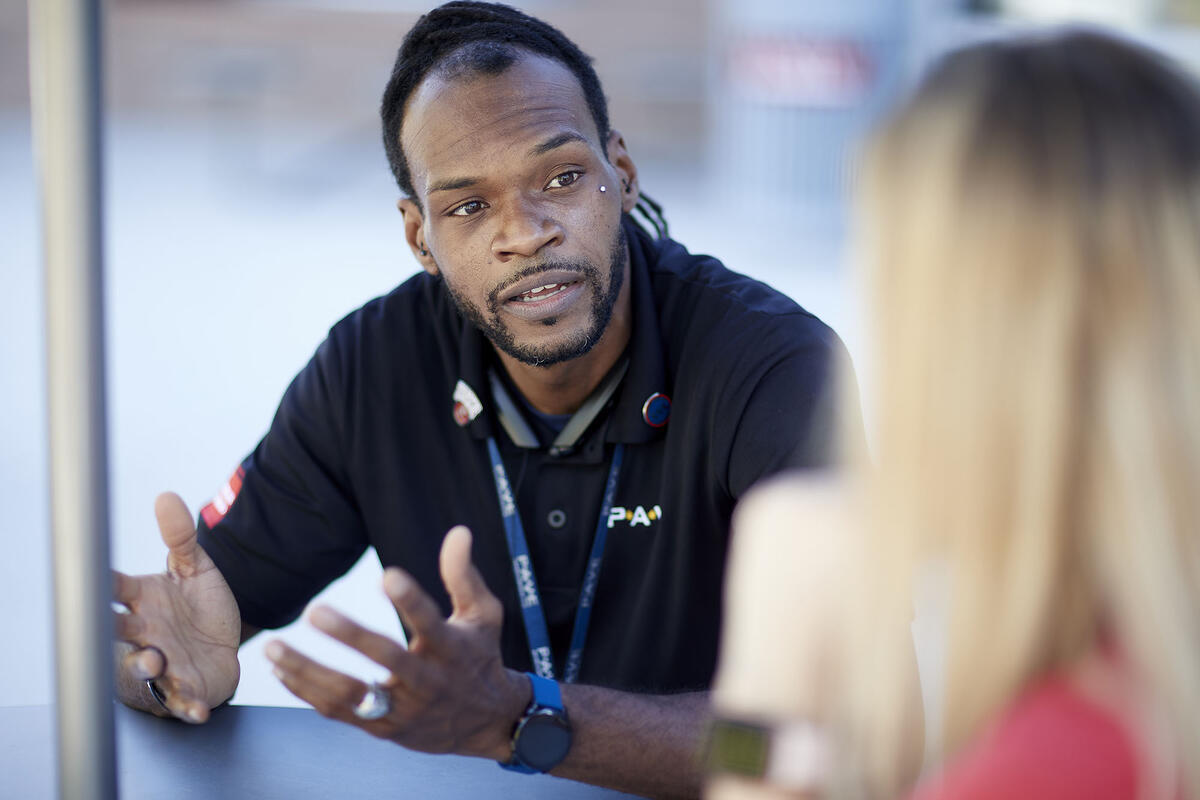Entering college can be puzzling for anyone, but for many students veterans, gaps in their educational journeys have made stepping back into the classroom a challenge. They may have trouble balancing schoolwork, personal lives, and jobs while trying to fit in among their fellow students.
“It’s like they have to learn how to be a student, how to write a report, how to study, how to manage their time,” said Rayshawn Williams, a Marine Corps veteran and current master’s in social work student. “It’s just a different approach to what they’re used to. A lot of veterans come from situations where they might have been micromanaged.”
Williams has thrown himself wholeheartedly into supporting the Southern Nevada and veteran communities. He was named Veteran of the Month by the Nevada Department of Veterans Services in July 2021 and spearheaded special projects with the UNLV Rebel Veterans student organization in addition to volunteering for nonprofits like United Way of Southern Nevada.
Since 2019, he’s carried that same zeal for service into his work for UNLV’s Peer Advisors for Veteran Education (PAVE). The free program offers peer support to veterans as they enter or return to a collegiate environment.
The program, founded at the University of Michigan, operates on more than 40 partner campuses across the country. UNLV became an adopter of the program through a grant in 2015.
Williams graduated with his bachelor’s degrees in criminal justice and social work in fall 2020. He expects to get his master’s in social work in spring 2022. As a PAVE lead, he has aided dozens of student veterans.
“We assist them with finding resources, making them feel comfortable and trying to restore that camaraderie that’s instilled in the military with having all of your peers around,” Williams said. “We try to replicate that.”
Another PAVE lead, Lisa Johnson, ’20 MSW, said the PAVE program gave her the opportunity to enhance her professional skills in communication and resource navigation.
She completed her two-semester concentration practicum for her social work degree with PAVE. As a team lead, she identified resources and assisted with the recruitment and training of peer advisors. Johnson and other social work graduate students with PAVE brainstormed ways to best integrate their specialized knowledge to benefit veterans in the program.
The entire experience — from the one-on-one meetings with students to the group discussions with fellow advisors — was helpful preparation for her future career, Johnson said. One of the most important and sensitive issues she discussed with student veterans was their mental health.
“As a social work student, the knowledge that I gained in my grad years, I was able to implement the therapeutic fundamentals into helping the students with their mental health,” Johnson said. “It was hard for them to really talk about it openly with anybody.”
PAVE trains student mentors to field questions on everything from finding a building on campus to strategic use of military education benefits. It’s not uncommon for PAVE advisors to field calls on issues like housing, finances or mental health, said Dwayne Gordon, UNLV’s Associate Director of Veteran Outreach.
He recalled one UNLV student who served in the Marine Corps sleeping in a car prior to the start of the academic semester. The student didn’t have a place to stay.
Once a PAVE advisor became aware of the situation, the office was able to help the student secure a hotel for a few nights before connecting the individual with housing.
“We just do our best to link them with resources,” Gordon said. “What we’re hoping for out of those activities that our peer advisors provide, we’re hoping that it eases the transition.”
Gaining Experience Outside of the Classroom
Though mentors can come from any academic discipline, seven of the 15 mentors in spring 2021 were master’s students completing a required School of Social Work practicum.
That’s the result of a successful partnership between UNLV’s Military and Veteran Services Center and the UNLV School of Social Work.
Social work students are optimal peer advisors for such a program because supporting community members is intrinsic to their future careers, said Ivet Aldaba, a School of Social Work lecturer.
The practicum partnership between PAVE and the School of Social Work allows social work students to put their classroom lessons into practice while also providing campus veterans with access to their uniquely skilled peers.
For the social work practicum students, it’s the application of years of classroom learning. They learn about the needs of student veterans while also learning how to better serve others, Aldaba said. “For PAVE Social Work students," she said, "this is the time when they realize, ‘This is a population I really want to work with.'"
That was certainly the case for Johnson. Her goal is to work both in clinical and macro social work, helping patients directly while advocating on their behalf on a larger scale. She also hopes to join the military, becoming part of a family tradition — her father and brother both served in the military — and giving her better insight into the lives of the veterans she’s working to help.



